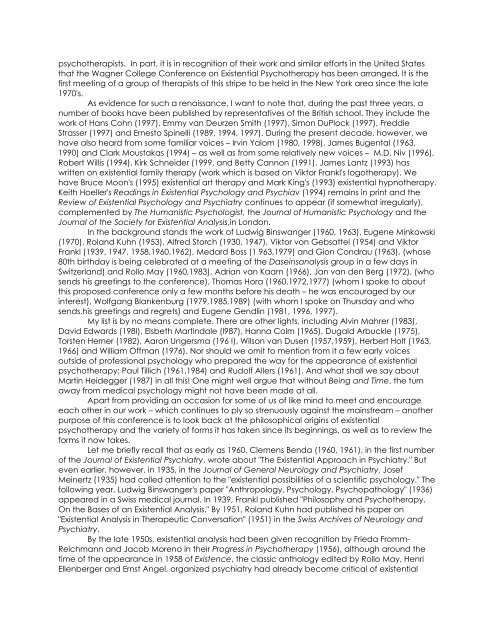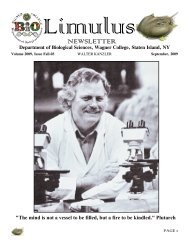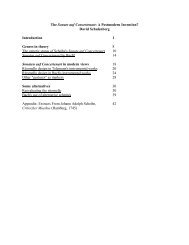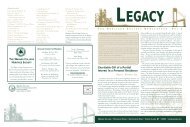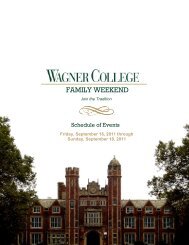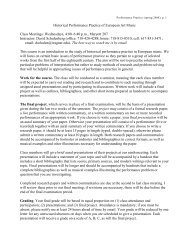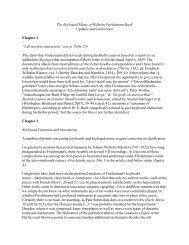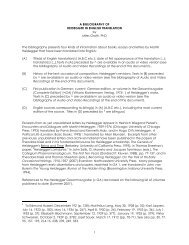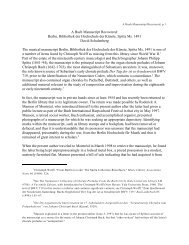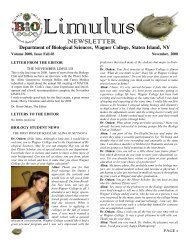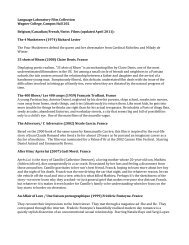SEVEN PAPERS ON EXISTENTIAL ANALYSIS ... - Wagner College
SEVEN PAPERS ON EXISTENTIAL ANALYSIS ... - Wagner College
SEVEN PAPERS ON EXISTENTIAL ANALYSIS ... - Wagner College
Create successful ePaper yourself
Turn your PDF publications into a flip-book with our unique Google optimized e-Paper software.
psychotherapists. In part, it is in recognition of their work and similar efforts in the United States<br />
that the <strong>Wagner</strong> <strong>College</strong> Conference on Existential Psychotherapy has been arranged. It is the<br />
first meeting of a group of therapists of this stripe to be held in the New York area since the late<br />
1970's.<br />
As evidence for such a renaissance, I want to note that, during the past three years, a<br />
number of books have been published by representatives of the British school. They include the<br />
work of Hans Cohn (1997), Emmy van Deurzen Smith (1997), Simon DuPlock (1997), Freddie<br />
Strasser (1997) and Ernesto Spinelli (1989, 1994, 1997). During the present decade, however, we<br />
have also heard from some familiar voices – Irvin Yalom (1980, 1998), James Bugental (1963,<br />
1990) and Clark Moustakas (1994) – as well as from some relatively new voices – M.D. Niv (1996),<br />
Robert Willis (1994), Kirk Schneider (1999, and Betty Cannon (1991). James Lantz (1993) has<br />
written on existential family therapy (work which is based on Viktor Frankl's logotherapy). We<br />
have Bruce Moon's (1995) existential art therapy and Mark King's (1993) existential hypnotherapy.<br />
Keith Hoeller's Readings in Existential Psychology and Psychiav (1994) remains in print and the<br />
Review of Existential Psychology and Psychiatry continues to appear (if somewhat irregularly),<br />
complemented by The Humanistic Psychologist, the Journal of Humanistic Psychology and the<br />
Journal of the Society for Existential Analysis,in London.<br />
In the background stands the work of Ludwig Binswanger (1960, 1963), Eugene Minkowski<br />
(1970), Roland Kuhn (1953), Alfred Storch (1930, 1947), Viktor von Gebsattel (1954) and Viktor<br />
Frankl (1939, 1947, 1958,1960,1962), Medard Boss (1 963,1979) and Gion Condrau (1963), (whose<br />
80th birthday is being celebrated at a meeting of the Daseinsanalysis group in a few days in<br />
Switzerland) and Rollo May (1960,1983), Adrian van Kaam (1966), Jan van den Berg (1972), (who<br />
sends his greetings to the conference), Thomas Hora (1960,1972,1977) (whom I spoke to about<br />
this proposed conference only a few months before his death – he was encouraged by our<br />
interest), Wolfgang Blankenburg (1979,1985,1989) (with whom I spoke on Thursday and who<br />
sends.his greetings and regrets) and Eugene Gendlin (1981, 1996, 1997).<br />
My list is by no means complete. There are other lights, including Alvin Mahrer (1983),<br />
David Edwards (198I), Elsbeth Martindale (l987), Hanna Colm (1965), Dugald Arbuckle (1975),<br />
Torsten Herner (1982), Aaron Ungersma (196 I), Wilson van Dusen (1957,1959), Herbert Holt (1963,<br />
1966) and William Offman (1976). Nor should we omit to mention from it a few early voices<br />
outside of professional psychology who prepared the way for the appearance of existential<br />
psychotherapy: Paul Tillich (1961,1984) and Rudolf Allers (1961). And what shall we say about<br />
Martin Heidegger (1987) in all this! One might well argue that without Being and Time, the turn<br />
away from medical psychology might not have been made at all.<br />
Apart from providing an occasion for some of us of like mind to meet and encourage<br />
each other in our work – which continues to ply so strenuously against the mainstream – another<br />
purpose of this conference is to look back at the philosophical origins of existential<br />
psychotherapy and the variety of forms it has taken since its beginnings, as well as to review the<br />
forms it now takes.<br />
Let me briefly recall that as early as 1960, Clemens Benda (1960, 1961), in the first number<br />
of the Journal of Existential Psychiatry, wrote about "The Existential Approach in Psychiatry." But<br />
even earlier, however, in 1935, in the Journal of General Neurology and Psychiatry, Josef<br />
Meinertz (1935) had called attention to the "existential possibilities of a scientific psychology." The<br />
following year, Ludwig Binswanger's paper "Anthropology, Psychology, Psychopathology" (1936)<br />
appeared in a Swiss medical journal. In 1939, Frankl published "Philosophy and Psychotherapy.<br />
On the Bases of an Existential Analysis." By 1951, Roland Kuhn had published his paper on<br />
"Existential Analysis in Therapeutic Conversation" (1951) in the Swiss Archives of Neurology and<br />
Psychiatry.<br />
By the late 1950s, existential analysis had been given recognition by Frieda Fromm-<br />
Reichmann and Jacob Moreno in their Progress in Psychotherapy (1956), although around the<br />
time of the appearance in 1958 of Existence, the classic anthology edited by Rollo May, Henri<br />
Ellenberger and Ernst Angel, organized psychiatry had already become critical of existential


